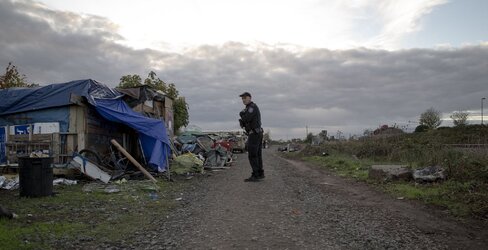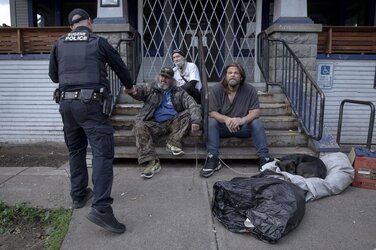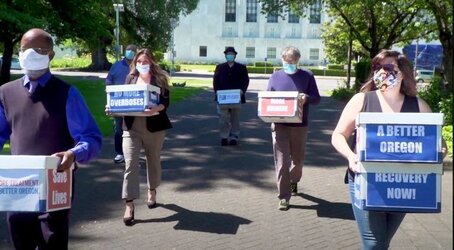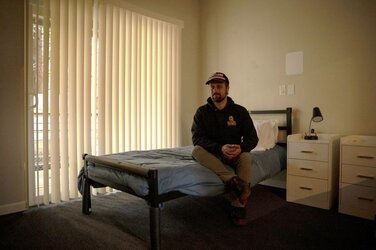
Officer Jose Alvarez of the Eugene Police Department recently visited an encampment for homeless people.
By Zusha Elinson | Photographs by Moriah Ratner for The Wall Street Journal
Nov. 11, 2023 9:00 pm ET
EUGENE, Ore.—Soon after Oregon became the first state to decriminalize all drugs in 2020, Officer Jose Alvarez stopped arresting people for possession and began giving out tickets with the number for a rehab helpline.
Most of the people smoking fentanyl or meth on this city’s streets balled them up and tossed them onto the ground.
“Those tickets frankly seemed like a waste of time,” said Alvarez, who stopped issuing them a few months after the law went into effect.
Nearly three years into an experiment that proponents hoped would spark a nationwide relaxation of drug laws, many in Oregon have turned against the decriminalization initiative known as Measure 110, which passed with 58% support in 2020.
People sprawled on sidewalks and using fentanyl with no fear of consequence have become a common sight in cities such as Eugene and Portland. Business owners and local leaders are upset, but so are liberal voters who hoped decriminalization would lead to more people getting help. In reality, few drug users are taking advantage of new state-funded rehabilitation programs.
Change appears likely. A coalition of city officials, police chiefs and district attorneys recently called on the State Legislature to recriminalize hard drugs. A measure to do so is in the works for next year’s ballot. A recent poll found the majority of Oregonians support the idea.
The fundamental problem, according to law-enforcement officers and researchers, is that the threat of jail time hasn’t been replaced with a new incentive for people struggling with addiction to seek treatment. Some 6,000 tickets have been issued for drug possession since decriminalization went into effect in 2021, but just 92 people have called and completed assessments needed to connect them to services, according to the nonprofit that operates the helpline.

Officer Jose Alvarez, who has stopped issuing tickets for drug possession, speaking with men in Eugene, Ore.
The only penalty for those who don’t call is a $100 fine, which is rarely enforced.
Before the law went into effect, people caught with small amounts of drugs were typically given a choice of court-mandated rehab or criminal sanctions such as jail time or probation.
“It was not a crazy thing to try at all, but I think they misunderstood addiction,” said Keith Humphreys, a Stanford professor who has studied the measure. “They really had the assumption that if you decriminalize, people would come rushing in saying, ‘Please, give me treatment,’ but addiction is not like cancer where people crawl through broken glass to get treatment.”
The number of fatal overdoses in Oregon during the 12 months that ended in May rose 23% from the same period a year earlier to 1,500, according to preliminary federal data. That is the third-highest increase in the nation, behind Washington and Nevada.
Advocates of drug decriminalization blame Oregon’s continued problems on nationwide trends, including the rise of deadly fentanyl and increased homelessness.
They say Measure 110 is already succeeding at one of its goals: keeping people out of the criminal-justice system for drug possession. About 4,000 people were arrested for drug offenses in Oregon in 2022, down from 11,000 in 2020.
Rather than using the threat of jail time, advocates for decriminalization say they are persuading people to get treatment by having them talk to former drug users.
“When people access services voluntarily…that’s really powerful and effective,” said Tera Hurst, executive director of the Health Justice Recovery Alliance, a nonprofit focused on implementing Measure 110.

Used needles are scattered at a homeless encampment near railroad tracks in Eugene.
Chris Wig, executive director of Emergence Addiction and Behavioral Therapies in Eugene, said though more people are getting peer support through programs funded by the measure, fewer are getting treatment. He said there has been a 25% drop in participation in Emergence’s programs.
“There are people who were getting treatment before who are not getting it now,” he said. “It’s people who were involved in the criminal justice system.”
A regretful pioneer
Oregon was the first state to decriminalize possession of marijuana, in 1973. Taking the same pioneering approach to hard drugs in 2020 proved easy, as Measure 110 faced little organized opposition.Michelle Loew, a 56-year-old bookstore clerk in Eugene, voted for it enthusiastically. A Grateful Dead fan who has experimented with mind-altering substances, Loew long supported liberalizing Oregon’s drug laws to be more like those of the Netherlands.
But as she watched public drug use flourish in this city of 175,000, she feared she had voted the wrong way.
“There is constant problems all over town—it doesn’t matter where you live—with people strung out on drugs,” said Loew, who described herself as a communist. “I pride myself on being a bit cynical, but obviously I was very naive.”
Overdose calls to Eugene police rose to 823 last year from 438 in 2020. So far this year, there have been 858. Though researchers attribute the rise in overdoses to the prevalence of fentanyl rather than the decriminalization measure, the drug problem has become more visible than ever.

Volunteers in 2020 delivered boxes containing signed petitions in favor of the decriminalization initiative. PHOTO: YES ON MEASURE 110 CAMPAIGN/ASSOCIATED PRESS
On a recent morning, Janina Rager, a community-engagement specialist with the Eugene police, roused a man who was sprawled in front of Gardner Floor Covering, a family-run store downtown. She asked him to leave and clean up the garbage that surrounded him, including bits of aluminum foil that are typically used as wrappers for meth or fentanyl.
The shop’s owner, Matt Siegmund, said the number of people loitering and doing drugs in front of his store has doubled since the measure passed. Customers are scared to walk in now, he said. Each morning, his employees must clear the sidewalk of debris that often includes feces or needles.
“It just keeps getting worse,” said Siegmund. “I feel like these people on the streets have more rights than I do.”

Matt Siegmund, owner of Gardner Floor Covering, says drug users who congregate in front of his store in Eugene leave garbage and scare off customers.
Rager swings by frequently to shoo people away, but the problem is unceasing. Eugene Police Chief Chris Skinner said most officers in his department, like Alvarez, have given up on issuing the drug-possession tickets.
“We don’t see people getting well as a result of issuing citations, and so it’s hard to get really excited about doing that work,” the chief said.
No reason to stay sober
On a recent weekday in downtown Portland, a man explained the varieties of fentanyl to a tourist who wanted to know what everyone was smoking off of small squares of aluminum foil. There were dozens of people doing it in the area, some swaying like zombies, others crumpled on the sidewalk.The man said getting arrested three years ago motivated him to get clean. He got a job at a gas station and stayed sober because it was required while he was on probation. But as soon as he finished probation last fall, he was back on drugs.
“I didn’t have a reason to keep clean and sober after that,” he said
Advocates for Measure 110 hope to have a more lasting effect by getting people into treatment voluntarily. Joe Bazeghi, the director of engagement for Recovery Works Northwest, said his organization, which is funded under the new measure, is now setting up rehab facilities for people addicted to fentanyl and making progress in persuading people to request treatment.

Joe Bazeghi, at his drug-rehab facility in Portland, says his organization is persuading more people to request treatment.
Bazeghi said he visits homeless encampments around Portland where he first tries to help people with basic needs such as health insurance, housing or food. Only later does he begin to talk to them about rehabilitation, based on his own experience with recovery.
“We go in as peers ourselves,” he said. “Everyone has been very welcoming to us.”
Changing course
Other states that once seemed likely to follow Oregon’s lead are pumping the brakes. Earlier this year Washington’s Democratic Gov. Jay Inslee signed a law that boosts funding for treatment while maintaining criminal penalties for drug possession.Oregon State Sen. Floyd Prozanski, a Democrat from the Eugene area who chairs a subcommittee focused on Measure 110, said he wants to see fixes to the law in next year’s legislative session. One idea on the table is taking people off the streets for 72 hours after they overdose.
Prozanski said he opposes bringing back criminal sanctions for drug possession.
Max Williams, former director of the Oregon state prison system, said he is skeptical the State Legislature will make adequate changes to the law. He heads a group preparing a measure for next year’s ballot that would again make it a crime to possess hard drugs such as fentanyl, while keeping in place the new funding for treatment, which comes from cannabis taxes.
“There is an old expression that states are the laboratories of democracy,” said Williams. “But that’s sort of distorted when you’re not the laboratory but you’re the lab rat.”
—Jon Kamp contributed to this article.
Source (Archive)